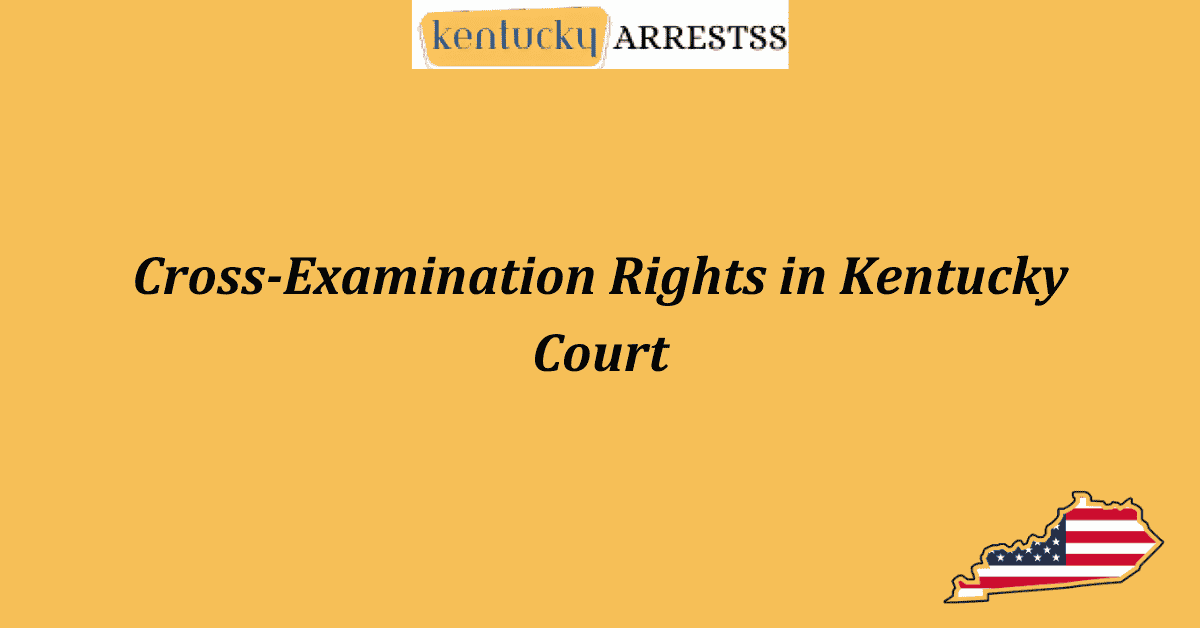Cross-Examination Rights in Kentucky Court
In Kentucky court, individuals have the right to cross-examine witnesses during a trial. This fundamental right allows both the prosecution and defense to question each other’s witnesses to challenge the credibility and accuracy of their testimony. Cross-examination is a crucial part of the legal process, providing an opportunity for attorneys to uncover inconsistencies, bias, or inaccuracies in witness statements. By exercising their cross-examination rights, parties can strengthen their case and ensure that all relevant information is brought to light.
Moreover, cross-examination rights play a vital role in upholding the principles of fairness and justice in the legal system. By allowing each party to question the other’s witnesses, the court ensures that all evidence is thoroughly examined and scrutinized. This process helps to safeguard against wrongful convictions or unjust outcomes by promoting transparency and accountability in the courtroom. Overall, cross-examination rights in Kentucky court serve as a cornerstone of the adversarial system, ensuring that all parties have the opportunity to present their case effectively and challenge opposing evidence.
Importance of Knowing Your Rights
Knowing your cross-examination rights is essential to ensure witness credibility and maintain a strong legal defense strategy. By understanding the rules and regulations surrounding cross-examination, you can effectively challenge witness testimony and evidence presented against you in court.
Rules and Regulations for Cross-Examination
In Kentucky courts, there are specific rules and regulations that govern cross-examination. It is important to familiarize yourself with these rules to ensure that your questioning of witnesses is conducted within legal boundaries. By following these rules, you can strengthen your legal defense and protect your rights in court.
Guidelines for Questioning Witnesses
When questioning witnesses during cross-examination, it is crucial to follow certain guidelines to ensure fairness and accuracy. By asking relevant and precise questions, you can challenge the credibility of witnesses and strengthen your legal defense. Understanding the proper techniques for questioning witnesses can significantly impact the outcome of your case.
Ensuring Fairness in Court Proceedings
Cross-examination rights play a vital role in ensuring fairness in court proceedings. By exercising your right to cross-examine witnesses, you can uncover inconsistencies in their testimony and bolster your legal defense strategy. Fairness in court proceedings is essential to upholding justice and protecting individual rights.
Empowering Individuals to Advocate Effectively
Empowering individuals to advocate effectively through cross-examination rights is crucial for a just legal system. By understanding how to question witnesses and challenge evidence, individuals can present their side of the story with confidence and clarity. Knowing your rights empowers you to actively participate in your legal defense.
Presenting Your Side of the Story
Through cross-examination rights, individuals have the opportunity to present their side of the story and challenge opposing evidence. By effectively questioning witnesses and presenting relevant information, you can strengthen your legal defense and advocate for your case. Presenting your side of the story is essential in ensuring a fair and just trial.
Exercising Cross-Examination Rights with Confidence
Exercising your cross-examination rights with confidence is key to a successful legal defense strategy. By preparing thoroughly and understanding the rules of cross-examination, you can approach questioning witnesses with confidence and assertiveness. Confidence in exercising your rights can significantly impact the outcome of your case.
Preparation for Legal Matters
Preparation is crucial when it comes to cross-examination rights in Kentucky courts. By preparing for legal matters and understanding the nuances of cross-examination, you can navigate court proceedings with confidence and clarity. Being prepared ensures that you can effectively advocate for your case and protect your rights in court.
Frequently Asked Questions
Our Frequently Asked Questions section aims to provide detailed information on Cross-Examination Rights in Kentucky Court. Below are some common queries related to this topic along with comprehensive explanations.
What is cross-examination in a Kentucky court?
Cross-examination in a Kentucky court is the process where the opposing party’s attorney questions a witness who has already testified. This allows the attorney to challenge the witness’s credibility, test their knowledge, and clarify any inconsistencies in their testimony.
What are the rights of a defendant during cross-examination in Kentucky?
In Kentucky, a defendant has the right to confront and cross-examine witnesses testifying against them. This right is protected by the Sixth Amendment of the U.S. Constitution and ensures that the defendant has a fair trial by being able to challenge the evidence presented against them.
Can a witness refuse to answer questions during cross-examination in Kentucky?
In Kentucky, a witness can refuse to answer questions during cross-examination if the questions are deemed irrelevant, privileged, or self-incriminating. However, a judge may compel the witness to answer if the questions are deemed necessary for the case.
How can an attorney prepare for cross-examination in a Kentucky court?
To prepare for cross-examination in a Kentucky court, an attorney must thoroughly review the witness’s testimony, gather evidence to contradict their statements, anticipate potential responses, and develop a strategic approach to challenge the witness effectively during the cross-examination.
What is the importance of cross-examination in a Kentucky court case?
Cross-examination plays a crucial role in a Kentucky court case as it allows the parties to test the credibility of witnesses, uncover inconsistencies in their testimony, and challenge the evidence presented against them. It helps ensure a fair trial by allowing each party to present their side of the story effectively.






